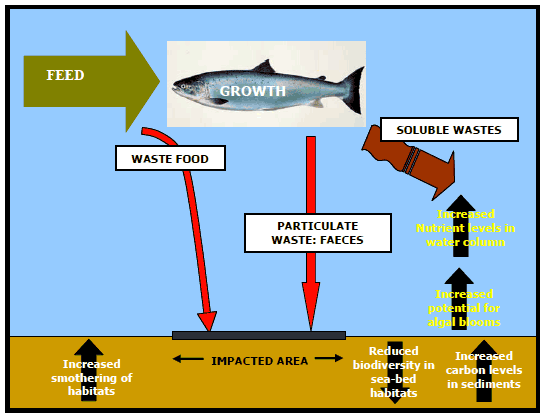What does corona-virus have to do with the salmon on your plate? Fidra investigates what the data really tells about the performance of Scotland’s salmon farms, and the impacts of COVID-19 on farming practices.
Coronavirus impacts everything
With the recent headlines that the Scottish Environmental Protection Agency (SEPA) are relaxing some of the regulations for Scottish salmon farms due to the outbreak of Covid-19, Fidra have been diving deeper to find out what this means for the sector, our environment and the salmon you eat. SEPA has written a temporary regulation position statement [1] , which details the terms for aquaculture production during the lock-down period.
What does this really mean?
This statement states that “Any failure to comply in full” with the current standards expected of salmon farms in Scotland, “will not be treated as a non-compliance when reporting on operator compliance”; as long as the farm notifies SEPA in advance and provides a reasonable explanation about how the outbreak of corona-virus has directly hampered their ability to comply. In essence, this means that in an instance where a specific site ‘breaks the rules’, SEPA will take a more lenient approach, and the farm will not be sanctioned as it may be, ordinarily.
In addition, SEPA has requested that the monitoring of salmon farms is now prioritised according to: overall performance (with the lowest performers being monitored first); biomass exceedance (how much [tonnes] salmon is produced and whether it goes over the licenced limit); and sites that have not recently been monitored. SEPA hope that they will be able to ensure the industry is compromised minimally, and that they will be able to track any potential non-compliance or issues that may arise as a result of the virus outbreak.
Why is the industry affected?
Due to the impacts of the outbreak of Coronavirus, the main concern for the industry is a decrease in staff available to support the harvesting of salmon from the pens they grow in. Some of these roles are permanent, but many of those employed to help harvest the salmon are seasonal, with farms seeking support from overseas. Therefore, there are concerns that salmon will spend an increased amount of time in the pens contributing to (i) shorter fallow periods, where pens are emptied to allow the habitats to recover from the impacts of the farming; (ii) increased biomass in pens as the salmon will continue to grow; and (iii) potential violations on stock-density (how much space is available per fish).
What are the environmental impacts?
Naturally, having more, bigger salmon in open net pens for longer, will have an impact on lochs and seabeds supporting salmon farming. This is primarily because of an inevitable increase in the level of waste produced by the salmon, made up of their faeces, as well as surplus food and medicinal treatments that sink to the bottom of the loch or seabed.

SOURCE: Scottish Government, Scottish Marine and Freshwater Science Vol. 3 No. 6
The waste the fish produce is of particular concern as it is made up of a variety of chemical treatments and nutrients that would not naturally occur, especially in such high concentration. This waste pollutes the immediate and surrounding ecosystems of the loch or seabed, which is referred to as the ‘benthos’ – the lowest ecological area in a body of water. A healthy benthos is essential for marine life because all species rely, directly or indirectly, on it to feed, rest or reproduce [2]. Yet, large volumes of salmon waste can smother this vital habitat, limiting the levels of oxygen available to it, and therefore the species that are able to survive.
The impacts of waste on the habitats under the salmon pens and in the surrounding are normally revealed in a benthic survey. These surveys look at the ecology and chemistry of the benthos and give an indication of impact the farm may be having on nearby habitats and species.
Read our blog on the impact salmon farming has on benthos in Scotland as we look closer at the data available.
Concluding remarks
Fidra’s Best Fishes project seeks to understand and minimize the environmental impacts of Scottish salmon farming. We frequently engage with regulators, such as SEPA, government and industry, as well as certification bodies, and understand the immediate impacts that relaxing such measures will have on Scotland’s marine environments. We will continue to examine the data, with special interest paid to this period of relaxed regulation, adding to the recommendations and actions we want to see to limit the negative impacts of Scotland’s unique marine habitats.
References
[1] https://coronavirus.sepa.org.uk/media/1013/covid19-finfish-aquaculture.pdf
[2] https://oap.ospar.org/en/ospar-assessments/intermediate-assessment-2017/biodiversity-status/habitats/condition-of-benthic-habitat-defining-communities/common-conceptual-approach/
